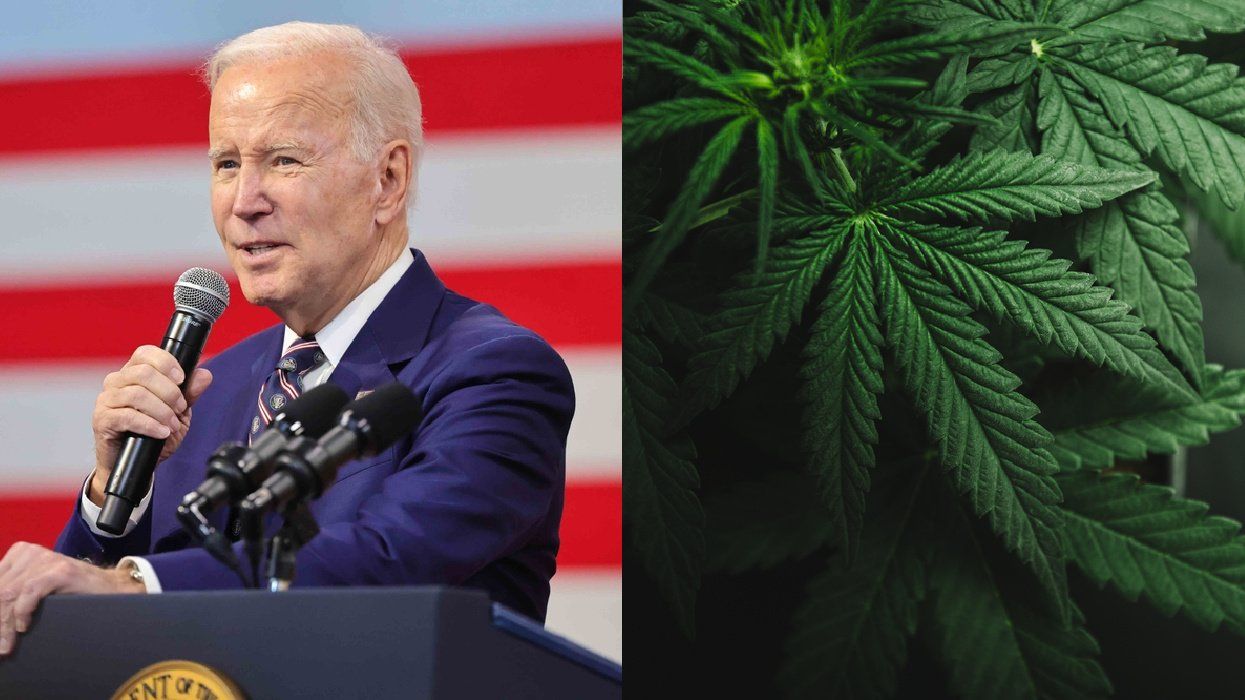It's no secret to those with their eyes on the polls — President Joe Biden's reputation has taken a hit.
Following his unconditional support of Israel after the October 7 Hamas attacks even as the Palestinian death toll in Gaza continues to rise, Biden's approval ratings have dropped to historic lows. A tracking poll from Gallup found an 11 percent point dip in his approval among Democrats in the past month, data gathered in part before the initial attacks.
While Biden was guaranteed to face backlash regardless of which position he held, his chosen one has grown more unpopular with Americans by the day (another poll from Data for Progress found that 66 percent of Americans across party lines support a ceasefire in Gaza.) With Arab American and youth voters threatening to withhold their votes for Biden in 2024, many hailing from key swing states, the question has arisen of what Biden can do to regain favorability.
The president has already helmed numerous progressive victories throughout his time in office — including passing the Respect For Marriage Act, the Inflation Reduction Act, and policies in support of labor unions — but there's one policy that's united Americans in recent years like no other.
The legalization of marijuana.
According to a newly published poll from Gallup, a record 70 percent of Americans support legalizing marijuana. That's 87 percent of Democrats, 70 percent of Independents, and even 55 percent of Republicans.
This transcends age as well, though younger Americans still report a higher rate of support: 79 percent of those ages 18 to 34, 71 percent of ages 35 to 54, and 64 percent of those 55 and older.
And if that's not enough, residents of Ohio voted earlier this week to legalize marijuana in a referendum, becoming the 24th state to permit the substance. Not only did 57 percent of voters support the measure, but marijuana legalization was more popular in every single one of the state's 88 counties than Biden was during the 2020 presidential election, according to data from CNN.
While legalizing marijuana has been shown to have positive economic, medical, and social outcomes, federal legalization is not as easy as signing an executive order.
In order to decriminalize the substance, it must first be removed from the list of scheduled substances. Marijuana is currently classified as a Schedule I drug, which Biden could theoretically change, but even to reschedule it as a Schedule III or IV substance would continue to prevent marijuana businesses from using banks, as they would still be in violation the Controlled Substances Act.
Only descheduling the substance can fully legalize it, which can only be done through Congress. The House of Representatives has voted to pass the Marijuana Opportunity Reinvestment and Expungement Act (MORE Act) both in 2020 and 2022, which would deschedule the substance, expunge prior cannabis convictions, impose a federal tax on marijuana products, and eliminate the existing conflict between federal and state laws. The Senate refused to even consider the bill both times.
While Republicans have rejected the MORE Act for its social equity programs, which would address the harm done to communities of color by the war on drugs, the reason for many Congressional Democrats' opposition to legalizing marijuana remains unclear, especially given that nearly 90 percent of their voting base supports it.
Even in Ohio, the Democratic Party did not explicitly endorse the measure to legalize marijuana, nor did their candidates campaign on it, according to CNN, despite doing so for the referendum to protect abortion access in the state. Biden himself has voiced his opposition for marijuana legalization, and has fired staffers for past marijuana use.
It's unfortunate to see Democratic leadership take such a hard stance against a policy with such widespread support. Biden could theoretically go down as one of the most beloved presidents in U.S. history, and mobilize young voters to lengths never before seen, by pursuing policy that is already popular across party lines — even just by throwing his support behind it, regardless of how the House and Senate vote.
Democratic leaders continue to show reluctance to fight for what their voters want, whether it be the legalization of marijuana, universal health care, or a ceasefire in Gaza. They also ignore the will of Independent voters, further alienating them from the party, when they have the potential to be Democrats' greatest allies in winning against Republicans.
Biden's dip in popularity isn't shared by candidates across the Democratic party, as demonstrated by overwhelming progressive victories in the 2023 elections. But as voters, organizations, and politicians alike have warned, support must continue to be earned.
Ryan Adamczeski is the Digital Director for The Advocate Channel. Views expressed in The Advocate Channel’s opinion articles are those of the writers and do not necessarily represent the views of The Advocate Channel or our parent company, equalpride.
Marijuana Myths

- The Biggest Takeaway From the 2023 Elections: Abortion Rights Prevail ›
- Pro-Palestine Protests Erupt Worldwide as Growing Majority Call For Ceasefire ›
- Will Biden's Response to the Israel-Hamas War Cost Him the 2024 Election? ›
- Marijuana May Not Cause Lung Cancer, But It's Still Not Good For You ›
- Monday's Top Stories: Biden & Latinos, Dwanye Johnson, Rafah ›
- Biden Sued For ‘Complicity’ in Israel’s ‘Genocide’ in Gaza ›
- Biden Threatens Visa Ban For 'Extremist' West Bank Settlers ›
- Voting Rights Act Disintegrates After Federal Court Ruling ›
- Tuesday's Top Stories: Thanksgiving Prices, OpenAI Debacle ›
- Here's Where the U.S. Is (Finally) Building High-Speed Rails ›



















































